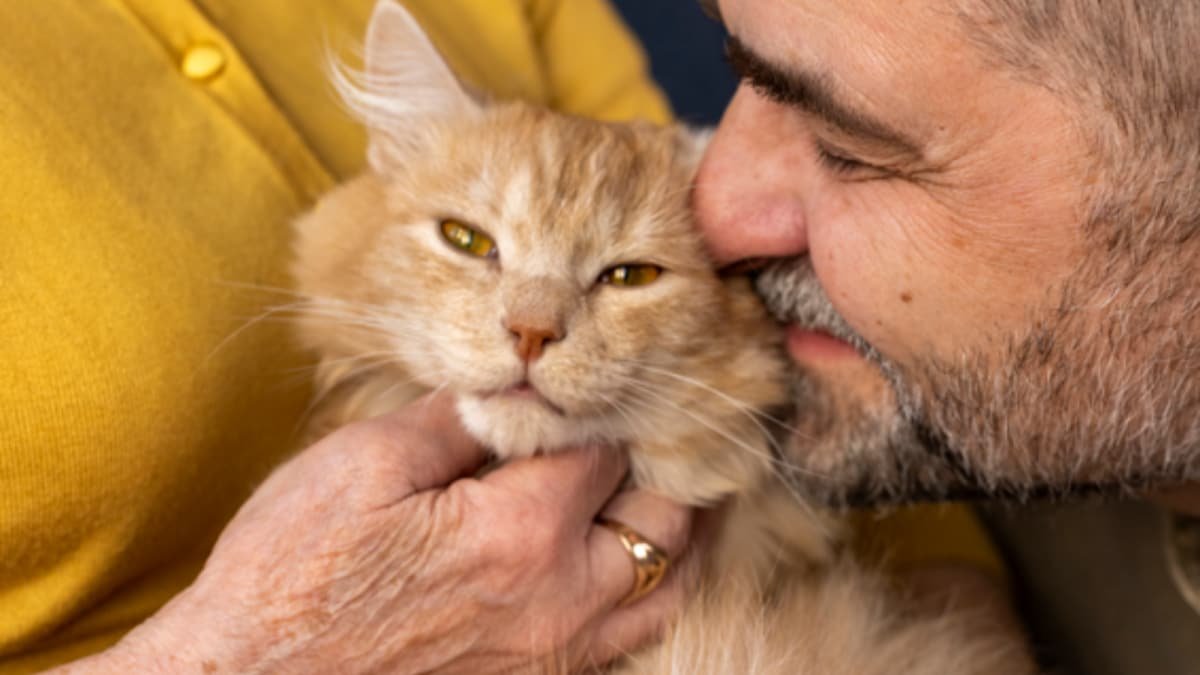Last Updated:July 06, 2025, 12:31 IST
Cats are complex, curious, and incredibly rewarding companions, but they are not plug-and-play pets
What is fuelling this feline fascination? Lower maintenance, quiet companionship, and a temperament that fits snugly into city life
India’s cat craze is catching on fast. According to the industry data, pet cats now make up nearly 9.5% of the country’s pet population, with an estimated 3.7 million felines purring their way into urban homes. That is a massive leap from just 2.4 million in 2022, showing how cats are becoming the go-to companions for apartment-dwelling millennials and Gen Z. Meanwhile, dog ownership still dominates at 88%, but the gap is narrowing.
What is fuelling this feline fascination? Lower maintenance, quiet companionship, and a temperament that fits snugly into city life. But here is the twist: many new cat parents walk in with a dog-care mindset, expecting their cats to fetch, cuddle on command, or thrive on constant attention. Spoiler: They do not.
“In cities like Mumbai, where space is limited, we are seeing a sharp rise in smaller dogs and especially cats. On our platform, Mumbai now shows an almost equal split between dog and cat parents,” shares Dr. Swathi Hareendran, Veterinary Expert, Supertails.
To help your cat feel at home and avoid any tail-twitching disasters, Dr Hareendran shares seven surprisingly common mistakes new cat parents make and how to fix them before your kitty gives you the cold shoulder.
1. Assuming Cats Do Not Need Space To Thrive
While cats can adapt to compact living far more easily than dogs, that doesn’t mean they do not need environmental stimulation. Vertical space (like shelves, window sills, and cat trees) is just as important as square footage. Cats love to perch, climb, and observe their territory from above; it helps them feel secure and mentally engaged.
Top Tip: Create multiple elevation zones with soft bedding, scratch posts, and hideaways. Even a small flat can feel like a jungle gym with the right setup.
2. Ignoring Their Sensitivity to Temperature
Unlike dogs, cats are highly sensitive to ambient temperature changes. They often gravitate towards sunlit patches, warm corners, or enclosed spaces when they feel cold. On the flip side, in hot Indian summers, poor ventilation or lack of cool zones can lead to lethargy or heat stress.
Pro Tip: Ensure your cat has access to both cosy warm spots and well-ventilated, shaded areas, especially in non-air-conditioned homes.
3. Treating Them Like Dogs (No, Really!)
Cats are not pack animals. They do not crave validation the way dogs do and tend to form slow, deep bonds on their terms. Trying to train or discipline a cat like a dog (e.g., yelling “No!” or expecting them to follow commands) can damage trust.
Reminder: Respect their boundaries, observe their cues, and reward with calm interaction; affection should be earned, not demanded.
4. Skipping Mental Enrichment
A common myth? “Cats entertain themselves.” Not quite. Without interactive play, puzzle toys, or sensory activities, cats can get bored, leading to stress, aggression, or destructive behaviour.
Try This: Invest in a feather wand, laser pointer, or puzzle feeder. Even 15–20 minutes of playtime a day can do wonders for their well-being.
5. Underestimating Their Social Needs
Cats are often thought to be solitary creatures, but many actually thrive on companionship. They may not jump on you like a dog would, but they will show affection in quieter ways: following you around, slow blinking, or curling up nearby.
Watch Out: If your cat is hiding constantly, it could be a sign of stress or unmet emotional needs, not just “independence.”
6. Overfeeding and Underplaying
Indoor cats are prone to obesity due to limited movement. Combine that with free feeding and lack of play, and you have a purring health hazard. Portion control and daily activity are non-negotiable.
7. Delaying Vet Visits Because ‘They Seem Fine’
Cats are masters of hiding discomfort. Whether it is a dental issue, joint pain, or gastrointestinal distress, they rarely show visible signs until things get severe.
Best Practice: Schedule annual wellness checks even if they appear healthy. Preventive care is far easier than emergency care.
Cats are complex, curious, and incredibly rewarding companions, but they are not plug-and-play pets. They need a thoughtful balance of respect, routine, and engagement. With a little awareness and a lot of love, you can avoid these beginner blunders and become the confident cat parent your feline deserves.

Swati Chaturvedi, a seasoned media and journalism aficionado with over 10 years of expertise, is not just a storyteller; she’s a weaver of wit and wisdom in the digital landscape. As a key figure in News18 Engl…Read More
Swati Chaturvedi, a seasoned media and journalism aficionado with over 10 years of expertise, is not just a storyteller; she’s a weaver of wit and wisdom in the digital landscape. As a key figure in News18 Engl… Read More
- First Published:
#Catastrophic #Mistakes #FirstTime #Cat #Parents #Lifestyle #News



